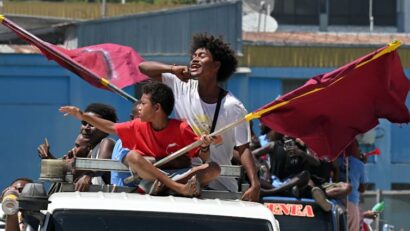
As China’s influence on Pacific media intensifies, Australia can’t afford to lose the region’s trust
When the people of Solomon Islands go to the polls on Wednesday, they will be voting for more than just a new prime minister. The election will also be a referendum on whether the country continues with incumbent Prime Minister Manasseh Sogavare’s growing strategic alliance with China.
Sogavare has remained secretive about the details of the security pact his government recently signed with China and is deeply sensitive to critique, particularly from the Australian media. In 2022, for example, he threatened to ban ABC journalists investigating the country’s links with China.
US Admiral John Aquilino on why a security deal between Solomon Islands and China is so concerning.
The security pact is just one small part of China’s sprawling Belt and Road Initiative, which has resulted in an expansion of Chinese influence across the region. This includes a focus on media. China has funded the training of Pacific journalists and their travel to China, and provided local media with syndicated content and financial support for infrastructure and vehicles.
There are allegations this funding has come with strings attached. The ABC reported last year that Solomon Islands’ oldest newspaper had received money from China in exchange for favourable coverage. (The Solomon Star’s editor said the newspaper maintained its independence – and had tried for years to obtain funding from Australia.)
The influence of Beijing is now so significant, the longtime journalist and Pacific specialist Sue Ahearn has said China is winning the information war in the Pacific.
Yet, according to research conducted by the ABC last year, Pacific islanders still overwhelmingly rely on – and trust – Australian media more than any other country’s media. In fact, five of six islands polled said ABC was the most valued and preferred international broadcaster.
Australia can’t rest on its laurels. It needs to build on this trust.
Read more:
What do people in the Pacific really think of China? It’s more nuanced than you may imagine
ABC rebooting Pacific services
The concern about China’s influence on Pacific media comes as the international broadcasting section at the ABC is trying to reboot. This comes after it made redundancies and cuts to services as part of efficiencies forced on it by the former Coalition government. Although the ABC maintained some broadcasting to the Pacific under the Coalition government, its international division had become a shadow of its former self.
The Albanese government has refocused efforts on the Pacific more broadly, pledging A$2 billion in the last budget to boost Australia’s security efforts in the region. It also boosted funding to the ABC’s international division with a $32 million grant, and invested another $8.5 million through 2027–28 to increase the reach of the ABC and other Australian media content across the region.
Supporters of former Deputy Speaker Namson Tran cheer and wave in a pre-election rally in Solomon Islands’ capital, Honiara.
Mick Tsikas/AAP
The funding boost has sent the ABC into a local recruitment drive to hire broadcast staff, particularly those who come from the region. It is also commissioning more “bespoke” lifestyle and sport content for the region.
The ABC and the Solomon Islands Broadcasting Corporation signed a memorandum of understanding last month. It formalised their “commitment to collaboration and support, with an emphasis on content sharing and media development programs”.
However, this funding has not yet allowed the ABC to provide a basic, reliable news service specifically for the Pacific to complement local services.
Solomon Islands media challenges
However, news outlets in Solomon Islands and, indeed, the wider Pacific still face entrenched challenges.
Some of these challenges are due to the small population base in many countries, limited advertising revenue and marginal profits. Research from the University of the South Pacific has found the Pacific has among the highest journalist attrition rates in the world. News outlets are mostly staffed by young, inexperienced and underqualified journalists, who are tasked with reporting on extremely complex issues.
Read more:
China is playing the long game in the Pacific. Here’s why its efforts are beginning to pay off
As we report in a chapter for our book, Transnational Broadcasting in the Indo-Pacific: The Battle for Trusted News and Information, Solomon Islands media workers are particularly vulnerable to foreign influence due to their economic precarity, age and level of education.
Another challenge is the cultural system of wantok – broadly meaning “one talk” in the Pijin language of Solomon Islands, which means a network of kin and connection. Because of wantok, many stories remain untold due to conflicts of interest involving journalists writing critical stories on their own families.
However, that hasn’t stopped all fearless reporting. A year-long investigation involving Solomon Islands journalists working for an international organisation, the Organized Crime and Corruption Reporting Project, reported last week that Sogavare has built at least eight new houses in and around the capital, Honiara, despite earning a modest salary. Sogavare did not respond to questions for the report, but has defended his land purchases in the past, saying he received loans from banks.
But this story, which is clearly of significance to voters heading to the polls, is not widely known and has mostly been distributed via Facebook on a volunteer-run news site, The Pacific Newsroom.
In such an environment, there is a clear need for a greater Australian media presence, not only to provide unbiased information to Solomon Islands voters and support the local media, but also to report on elections and other domestic issues for regional audiences.
This is why the ABC needs guaranteed funding for its international services – free from further government or managerial interference – to ensure this role in supporting Pacific media isn’t lost again. Läs mer…